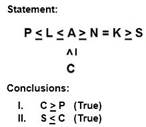
Dear Readers,
Mahendras has started special quizzes for IBPS |RBI | NABARDI Exam so that you can practice more and more to crack the examination. This IBPS | RBI | NABARD special quiz series will mold your preparations in the right direction and the regular practice of these quizzes will be really very helpful in scoring good marks in the Examination. Here we are providing you the important question of reasoning ability for the IBPS |RBI | NABARD Exam.
Q.1-5. Study the following information carefully and answer the questions given below.
In a certain code language, “many records are found” is written as “gm lo so ne”, “records are never wrong” is written as “fa ta so gm”, “never have right records” is written as “gm jo ta pk” and “found wrong answer” is written as “ne fa do”.
निम्नलिखित जानकारी का ध्यानपूर्वक अध्ययन करें तथा नीचे दिए गए प्रश्नों के उत्तर दें।
एक निश्चित कोड भाषा में, “many records are found” को “gm lo so ne”, “records are never wrong” को “fa ta so gm”, “never have right records” को “gm jo ta pk” और “found wrong answer” को “ne fa do” लिखा जाता है।
Q.1. How “many right answer” may be written in that code language?
“many right answer” को उसी कोड भाषा में कैसे लिखा जा सकता है?
01. lo pk jo
02. to gm jo
03. to so pk
04. fa lo pk
05. pk do lo
Q.2. “ta ne lo” is stand for-
“ta ne lo” का अर्थ है-
01. never answer found
02. answer never wrong
03. never many found
04. many found records
05. Cannot be determined /निर्धारित नहीं किया जा सकता है
Q.3. What is the code for “right” in that code language?
01. jo
02. fa
03. pk
04. either jo or pk
05. Cannot be determined
उसी कोड भाषा में "right” के लिए कोड क्या है?
01. jo
02. fa
03. pk
04. या तो jo या pk
05. निर्धारित नहीं किया जा सकता है।
Q.4. “What is the code for “wrong” in that code language?
उसी कोड भाषा में "wrong” के लिए कोड क्या है?
01. fa
02. gm
03. do
04. ne
05. so
Q.5. If “records answer absolute” is written as “gm do px” then how “many genius give absolute answer” may be written in that code language?
यदि "records answer absolute” को "gm do px” लिखा जाता है तो उसी कोड भाषा में "many genius give absolute answer” को कैसे लिखा जा सकता है?
01. lo ya sa ne do
02. lo fa px do jo
03. lo jo px um gm
04. jo um ta fa pk
05. lo je re px do
Q.6-10. In the following questions, relationship between different elements is shown in the statement. These statements are followed by two conclusions I and II.
01. If only conclusion I is true.
02. If only conclusion II is true.
03. If either conclusion I or II is true.
04. If neither conclusion I nor II is true.
05. If both conclusions I and II are true.
निम्न प्रश्नों में, दिये गये कथनों में विभिन्न तत्वों के बीच संबंध दर्शाया गया है। इन कथनों के बाद दो निष्कर्ष I और II दिए गए हैं।
01. यदि केवल निष्कर्ष I सत्य है।
02. यदि केवल निष्कर्ष II सत्य है।
03. यदि या तो निष्कर्ष I या II सत्य है।
04. यदि न तो निष्कर्ष I न ही II सत्य है।
05. यदि दोनों निष्कर्ष I और II सत्य है।
Q.6. Statements: P < L < A > N = K > S, C > A
Conclusions: I. C > P II. S < C
कथन: P < L < A > N = K > S, C > A
निष्कर्ष: I. C > P II. S < C
Q.7. Statements: I < J < K < L > M > N, B > K, B=S
Conclusions: I. S > I II. S > N
कथन : I < J < K < L > M > N, B > K, B=S
निष्कर्ष: I. S > I II. S > N
Q.8. Statements: J > U > N = K < E < D
Conclusions: I. U > D II. N > D
कथन: J > U > N = K < E < D
निष्कर्ष: I. U > D II. N > D
Q.9. Statements: P < L < A > N = K > S, C > A
Conclusions: I. K > L II. L < K
कथन : P < L < A > N = K > S, C > A
निष्कर्ष: I. K > L II. L < K
Q.10. Statements: I < J < K < L > M > N, B > K, B=S
Conclusions: I. S > J II. L > J
कथन : I < J < K < L > M > N, B > K, B=S
निष्कर्ष: I. S > J II. L > J
ANSWER-
Q.1-5.

Q.1. (5)
Q.2. (3)
Q.3. (4)
Q.4. (1)
Q.5. (5)
Q.6. (5)

Q.7. (1)
Statement/ कथन:

Conclusions/ निष्कर्ष:
I. S > I (True/ सत्य)
II. S ≥ N (False/ असत्य)
Q.8. (4)
Statement/ कथन: J > U ≥ N = K ≤ E < D
Conclusions/ निष्कर्ष:
I. U > D (False/ असत्य)
II. N > D (False/ असत्य)
Q.9. (3)
Statement/ कथन:

Conclusions/ निष्कर्ष:
I. K ≥ L
II. L ≤ K
Either I or II is true/ या तो I या II सत्य है।
Q.10. (2)
Statement/ कथन:

Conclusions/ निष्कर्ष:
I. S > J (False/असत्य)
II. L ≥ J (True/सत्य)




0 comments:
Post a Comment
MAHENDRA GURU